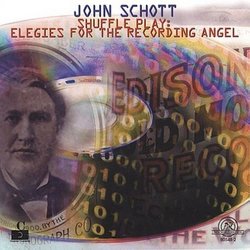Amazon.comComposer-guitarist John Schott has a fascination with the past, as well as with the convergence of idioms. It shows up in his work with the band Junk Genius, in which he plays free jazz with a National steel guitar, but it's central to this extended composition, too. The basis of the work is a series of ancient recordings, scratchy near-inaudible cylinders from the end of the 19th century that include "Twinkle Twinkle, Little Star," whistling, speeches, and a bugle call. These are used as backdrops or central voices in several of the 28 pieces that make up Shuffle Play, pieces that range from pointillist modern classical composition to free jazz to mixtures of the two. Tracks vary in length from atmospheric bits as brief as 10 seconds to more than seven minutes, while Schott's Ensemble Diglossia expands from individual soloists through small improvising groups to reach an 11-member chamber ensemble of reeds, strings, and percussion for four tracks. Shuffle Play is intended to be played with a CD player's "shuffle" selector, each "performance" creating a new work with a different ordering of messages. Schott includes Julio Cortazar's novel Hopscotch in his bibliography, and his method seems directly derived from the book's instructions for varied reading sequences. The significance of individual parts changes with altered context, particularly as the most potent tracks move around. Track 21, combining eerie strings and the vibrating depths of contra-alto clarinet with a Passamaquody Indian snake-dance song, and track 20, virtually the Junk Genius quartet improvising on the early African American "Poor Mourner" by Cousins and DeMoss, are strong stuff. Though the compositional frame and its processes are intriguing, any of the longer tracks can stand alone as fully realized music. The improvised input from several players--clarinetist Ben Goldberg, saxophonist Dan Plonsey, trombonist Tom Yoder, and drummer Scott Amendola--is especially distinguished. --Stuart Broomer


 Track Listings (28) - Disc #1
Track Listings (28) - Disc #1